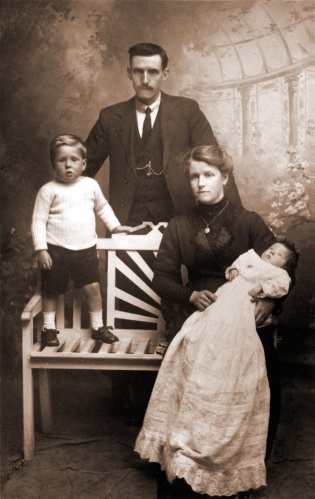I am a Scottish coal miner’s granddaughter. It seems hard to believe. I have lived my entire life in California, a life as different from my grandfather’s as the sunny California beaches are from the dreary Scottish coal mines. His name was William Miller, but people called him Bill. His petite, plucky wife, my grandmother, was named Bella. They both died before I was born, so I was never able to thank them for the legacy they left me, a legacy honed with grit, hard work, and sacrifice. These qualities got them to California in the mid-1920s with six young children in tow and helped them battle the Great Depression that bore down on them not long after their arrival. In the end, these qualities were not enough. They both died young, defeated by what they had left Scotland to avoid. Here is their story.
They were a poor family in Bellshill, Scotland, a coal mining town twelve miles south of Glasgow, in Lanarkshire. Bill’s father and grandfather were both coalminers. His grandfather had migrated to Scotland from Ireland to escape the Irish potato famine. Born in 1887, Bill was the second of four children in his family. Bella was born later that year to William and Marion Bullock, the seventh of eight children. Her father was also a coal miner, as was his father.
Bill and Bella married in 1910 when he was 23 and she, 22. They were an attractive couple, though a study in contrasts—Bill, with his dark eyes, hair, and complexion; Bella with her blue eyes, fair skin and sandy-colored hair. She was a good foot shorter than her five-foot-ten-inch husband, and more talkative and comfortable around people. Within seven years, they had four children, a boy and three girls.
Life was tough for coal mining families then, even more so than now, with long workdays and meager pay. Bill had been working in coal mines since he was a boy, and knew little else. But working conditions had become intolerable as increasing miners’ strikes kept him unemployed for long periods of time, substantially decreasing their already limited income. Deciding they had had enough, they began thinking about letters they had received from Bella’s sister Jessie Mallon, who lived in Duryea, Pennsylvania. Her husband, James, had acquired a job in the coal mines near Pittston and claimed he could find work for Bill as well. Bill should come and work for a few months, find a place to live, and then send for Bella and the children.
It had to be a difficult decision, requiring weighing family ties against the opportunity to provide a better life for their children. Their parents on both sides were in their 70s. Travel was expensive and sometimes precarious in those days. Who knew if they’d ever see their families again? Perhaps this was just a foolhardy idea, a waste of money they would regret forevermore. Wouldn’t it be safer to stick with the known rather than risking everything? Continue reading

